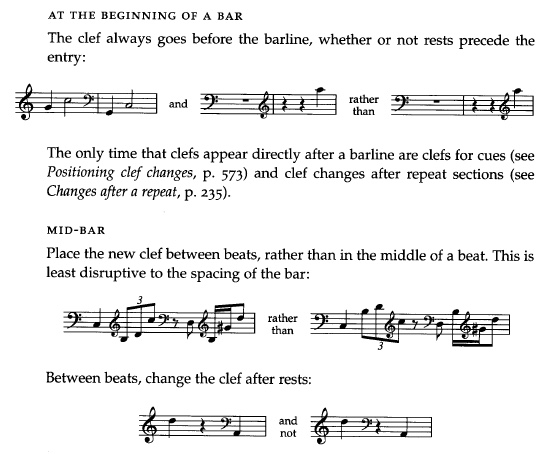Page 1 of 2
Placing of a clef change.
Posted: 17 Apr 2021, 21:52
by David Ward
It's usually thought best to place the new clef after a clef change immediately before the first music to which it applies. However, what about if there is also an instrument change? Might it then be appropriate to show the change at the same place as the indication to change instrument (in my habitual terminology ‘take instrument x’ or ‘to instrument y’)?
See screenshots in which player moves from temple blocks to glockenspiel.
Re: Placing of a clef change.
Posted: 18 Apr 2021, 12:24
by David Ward
Does anyone on the forum have views on this subject?
Looking at the percussion part (screenshot), I see I have not been consistent in where I have placed changes to the percussion clefs in relation to the instruction to change instrument.
This is a tiny two minute miniature. When it was recorded soon after it was written
https://composers-uk.com/davidward/wp-c ... ve.mp3?_=8 there were no comments, adverse or otherwise, fed back to me about notation; and yes, I can see several engraving solecisms, but nevertheless at the time it seemed to serve its purpose.
Re: Placing of a clef change.
Posted: 18 Apr 2021, 14:22
by RMK
I don't see how else you could have notated it due to the Violin cue.
Re: Placing of a clef change.
Posted: 18 Apr 2021, 16:45
by John Ruggero
To me it would look more natural to have the clef change immediately after the To Glockenspiel rather than before it, since the player had been playing in the percussion clef until that point. And a case could be made for placing the clef even closer to the Glock. entrance to reinforce the change visually.
Re: Placing of a clef change.
Posted: 19 Apr 2021, 15:16
by David Ward
As so often, your advice, John, makes perfect sense. It looks fine (correct indeed) with the treble clef placed immediately before the first note on glockenspiel.
Re: Placing of a clef change.
Posted: 20 Apr 2021, 02:42
by John Ruggero
Thank you very much, David. I'm glad it helped. I guess the common way of handling clef changes that you mentioned in the OP applies in this case as well. Maybe that is why Gould doesn't mention it.
Re: Placing of a clef change.
Posted: 22 Apr 2021, 13:45
by Anders Hedelin
Actually Gould has a remark on placing changing clefs (p.8) - when possible, always before the barline. Whether this is meant as an absolute rule or not, I'm not sure, but in this particular case it seems appropriate to let the clef go with the change of metre and tempo, and be placed before the barline of b. 22.
Re: Placing of a clef change.
Posted: 23 Apr 2021, 03:29
by John Ruggero
I find her comments confusing and seemingly self-contradictory. I must be missing the point or the context:

- Gould.jpeg (76.11 KiB) Viewed 4018 times
Does she mean that if a measure begins with rests, the clef change should go before the bar line rather than before the actual first played note in the measure? (Since she doesn't seem to like the "rather than" example.) I have seen this done by some publishers, but I also have seen it done the other way as well, and perhaps much more so. An example taken at random from Schenker's edition of the first movement of Beethoven's op. 109

- op 109.1 Schenker.jpeg (76.6 KiB) Viewed 4018 times
The first edition and the manuscript do the same.

- op 109 Artaria.jpeg (45.31 KiB) Viewed 4018 times

- op 109.1 MS.jpeg (53.36 KiB) Viewed 4018 times
Re: Placing of a clef change.
Posted: 23 Apr 2021, 13:25
by David Ward
In Elaine Gould speak I believe ‘rather than’ indicates a preference, while ‘and not’ is a rule (as far as is practical).
I think I prefer most clef changes to be immediately before the notes to which they first apply, so FWIW it seems my preference in this, if not in too much else, may be different from Gould's. However, I'm a rank amateur at computer ‘engraving’, having spent five decades using a pen or pencil to write music before I first tried a computer almost exactly twenty years ago. I feel I may steadily be getting better at it, but…
Re: Placing of a clef change.
Posted: 23 Apr 2021, 16:41
by John Ruggero
I agree with you, David, and prefer a new clef placed immediately before the first played notes if placed in the middle of a measure.
Actually, it wasn't the "rather than" per se that confused me but the following:
1. After saying that "The clef always goes before the bar line", she gives examples of mid-measure clefs! Clearly, the first statement has to do with a situation that doesn't seem to be defined clearly, at least, to me.
2. "The clef always goes" in conjunction with the "rather than" example. If she means that a clef that pertains to the following
whole measure should come before the bar line and not immediately after it, the counter-example example should look like this:

- Gould example.jpeg (12.21 KiB) Viewed 3991 times
But I don't think I have ever seen it done that way and would call it a "not", not a "rather than", just like the final example under "Mid-bar".
So I guess I just don't get it.